| Listing 1 - 10 of 14 | << page >> |
Sort by
|
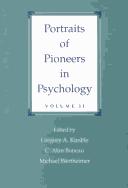
ISBN: 0805811362 0805821988 1557984794 Year: 1991 Publisher: Hillsdale, NJ ; Hove : Washington, DC : Lawrence Erlbaum Associates [LEA], American Psychological Association,
Abstract | Keywords | Export | Availability | Bookmark
 Loading...
Loading...Choose an application
- Reference Manager
- EndNote
- RefWorks (Direct export to RefWorks)
Geschiedenis van de psychologie --- biografieën --- #PBIB:1999.4 --- biografieën. --- Biografieën.

ISBN: 0205154034 Year: 1996 Publisher: Boston, MA ; London ; Toronto, Ont : Allyn and Bacon,
Abstract | Keywords | Export | Availability | Bookmark
 Loading...
Loading...Choose an application
- Reference Manager
- EndNote
- RefWorks (Direct export to RefWorks)
Psychology --- Geschiedenis van de psychologie --- History. --- handboeken en inleidingen --- handboeken en inleidingen.
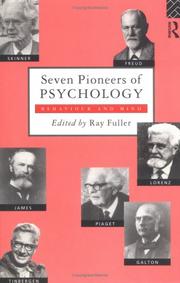
ISBN: 0415099803 Year: 1994 Publisher: London New York Routledge
Abstract | Keywords | Export | Availability | Bookmark
 Loading...
Loading...Choose an application
- Reference Manager
- EndNote
- RefWorks (Direct export to RefWorks)
Biografieën. --- Behavioral scientists --- Psychology --- Geschiedenis van de psychologie --- Biography. --- History. --- History --- Psychologists --- Biography --- Behavioral scientists - Biography.
Book
ISBN: 2130397018 9782130397014 Year: 1986 Volume: 97 Publisher: Paris : P.U.F.,
Abstract | Keywords | Export | Availability | Bookmark
 Loading...
Loading...Choose an application
- Reference Manager
- EndNote
- RefWorks (Direct export to RefWorks)
Psychopathology --- history --- Geschiedenis van de psychologie --- PSYCHOPATHOLOGY --- klassieke scholen --- klassieke scholen. --- history. --- Klassieke scholen. --- History. --- Psychopathologie. Histoire. --- Psychopathologie. Geschiedenis.

ISBN: 0521480213 0521034760 0511571321 Year: 1996 Publisher: Cambridge : Cambridge University Press,
Abstract | Keywords | Export | Availability | Bookmark
 Loading...
Loading...Choose an application
- Reference Manager
- EndNote
- RefWorks (Direct export to RefWorks)
In this volume, prominent American and European scholars explore the historical shaping of psychological discourse. Speaking from several disciplinary standpoints, attention is directed to the ideological, intellectual, political, economic and literary forces that enter into the cultural construction of mental life. In its explorations, the volume not only challenges the reality of the taken for granted world of everyday life, but raises fundamental questions concerning the potential of psychological science to establish historically independent knowledge of mental process. Contributions to the volume treat a variety of subjects, including the emotions, cognition, the concept of child development, psychotherapy, gender differences and knowledge. Additional chapters represent first-hand accounts of historical change in psychological movements.
Psychology --- -Behavioral sciences --- Mental philosophy --- Mind --- Science, Mental --- Human biology --- Philosophy --- Soul --- Mental health --- History --- Geschiedenis van de psychologie --- History. --- handboeken en inleidingen. --- Health Sciences --- Psychiatry & Psychology
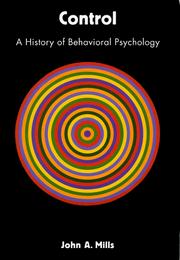
ISBN: 0814759963 0585424802 9780585424804 0814756115 9780814756119 9780814759967 0814756123 Year: 1998 Publisher: New York London New York University Press
Abstract | Keywords | Export | Availability | Bookmark
 Loading...
Loading...Choose an application
- Reference Manager
- EndNote
- RefWorks (Direct export to RefWorks)
Behaviorism has been the dominant force in the creation of modern American psychology. However, the unquestioned and unquestioning nature of this dominance has obfuscated the complexity of behaviorism. Control serves as an antidote to this historical myopia, providing the most comprehensive history of behaviorism yet written. Mills successfully balances the investigation of individual theorists and their contributions with analysis of the structures of assumption which underlie all behaviorist psychology, and with behaviorism's role as both creator and creature of larger American intellectual patterns, practices, and values. Furthermore, Mills provides a cogent critique of behaviorists' narrow attitudes toward human motivation, exploring how their positivism cripples their ability to account for the unobservable, inner factors that control behavior. Control's blend of history and criticism advances our understanding not only of behaviorism, but also the development of social science and positivism in twentieth-century America.
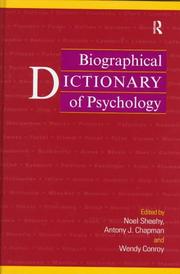
ISBN: 0415099978 9780415099974 Year: 1997 Publisher: London: Routledge,
Abstract | Keywords | Export | Availability | Bookmark
 Loading...
Loading...Choose an application
- Reference Manager
- EndNote
- RefWorks (Direct export to RefWorks)
Psychologists --- Psychology --- Psychologues --- Psychologie --- Biography --- Dictionaries --- History --- Biographie --- Dictionnaires anglais --- Histoire --- Psychologue --- --Psychanalyste --- --Psychologists --- Geschiedenis van de psychologie --- Dictionaries. --- History. --- biografieën --- biografieën. --- Biografieën. --- Psychanalyste --- Psychologists - Biography - Dictionaries --- Psychology - History
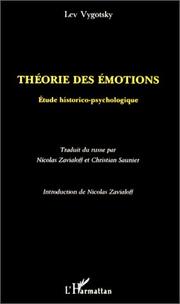
ISBN: 2738461352 9782738461353 Year: 1998 Publisher: Paris: L'Harmattan,
Abstract | Keywords | Export | Availability | Bookmark
 Loading...
Loading...Choose an application
- Reference Manager
- EndNote
- RefWorks (Direct export to RefWorks)
La notion d'émotion n'est point absente de la création littéraire, de la vie politique, de la pédagogie, des sciences cognitives ou des neurosciences. Mais il conviendrait d'expliciter aux plans biologique et idéologique la nature de ses liens avec la notion d'intellect. Dans Théorie des émotions, Vygotsky critique avant tout la définition que donne Descartes des passions. Son approche des émotions invite à une réflexion préalable à la lecture d'ouvrages actuels qui prennent pour objet d'étude les processus de cognition, d'évaluation, de conscience, d'imagination et de mémoire.
Emotions --- Psychology --- Psychologie --- Psychologie cognitive --- Passions --- Emotions (philosophie) --- Geschiedenis van de psychologie --- handboeken en inleidingen --- handboeken en inleidingen. --- Psychologie cognitive. --- Émotions. --- Passions. --- Émotions (philosophie) --- Émotions. --- Émotions (philosophie) --- Handboeken en inleidingen.
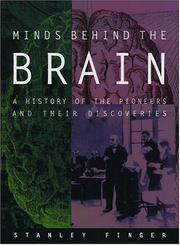
ISBN: 019508571X 0195181824 0198024681 1280704217 9780195085716 Year: 2000 Publisher: Oxford: Oxford university press,
Abstract | Keywords | Export | Availability | Bookmark
 Loading...
Loading...Choose an application
- Reference Manager
- EndNote
- RefWorks (Direct export to RefWorks)
Preface 1. Introduction: A Voyage Across Time 2. An Ancient Egyptian Physician: The Dawn of Neurology 3. Hippocrates: The Brain as the Organ of the Mind 4. Galen: The Birth of Experimentation 5. Andreas Vesalius: The New ""Human"" Neuroanatomy 6. Rene Descartes: The Mind-Body Problem 7. Thomas Willis: The Functional Organization of the Brain 8. Luigi Galvani: Electricity and the Nerves 9. Franz Joseph Gall: The Cerebral Organs of Mind 10. Paul Broca: Cortical Localization and Cerebral Dominance 11. David Ferrier and Edward Hitzig: The Experimentalists Map the Cerebral Cortex 12. Je
Neurosciences --- Brain --- Physicians --- History --- Research --- physiology --- history --- Geschiedenis van de psychologie --- History. --- handboeken en inleidingen --- handboeken en inleidingen. --- Cerveau --- Système nerveux --- Neurosciences - History --- Brain - Research - History --- Brain - physiology --- Neurosciences - history --- Dimension historique --- Methode de recherche
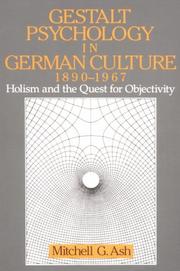
ISBN: 0521646278 9780521646277 0521475406 9780521475402 Year: 1998 Publisher: Cambridge: Cambridge university press,
Abstract | Keywords | Export | Availability | Bookmark
 Loading...
Loading...Choose an application
- Reference Manager
- EndNote
- RefWorks (Direct export to RefWorks)
This is a full-length historical study of Gestalt psychology - an attempt to advance holistic thought within natural science. Holistic thought is often portrayed as a woolly-minded revolt against reason and modern science, but this is not so. On the basis of rigorous experimental research and scientific argument as well as on philosophical grounds, the Gestalt theorists Max Wertheimer, Wolfgang Kohler and Kurt Koffka opposed conceptions of science and mind that equated knowledge of nature with its effective manipulation and control. Instead, they attempted to establish dynamic principles of inherent, objective order and meaning, in current language, and principles of self-organization, in human perception and thinking, in human and animal behavior, and in the physical world. The impact of their work ranged from cognitive science to theoretical biology and film theory. Based on exhaustive research in primary sources including archival material, this study illuminates the multiple social and intellectual contexts of Gestalt theory and analyses the emergence, development and reception of its conceptual foundations and research programmes from 1890 to 1967
Gestalt psychology --- Psychology --- Gestaltpsychologie --- Psychologie --- History --- Histoire --- Behavioral sciences --- Mental philosophy --- Mind --- Science, Mental --- Human biology --- Philosophy --- Soul --- Mental health --- Configuration (Psychology) --- Form psychology --- Psychology, Structural --- Structural psychology --- Consciousness --- Ejection (Psychology) --- Knowledge, Theory of --- Perception --- Senses and sensation --- History. --- Geschiedenis van de psychologie --- Gestalt therapy --- Objectivity --- Holism
| Listing 1 - 10 of 14 | << page >> |
Sort by
|

 Search
Search Feedback
Feedback About UniCat
About UniCat  Help
Help News
News